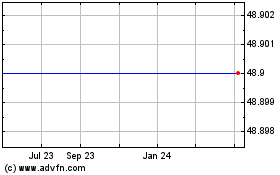Western States Look To Oil Industry For Extra Cash
April 06 2010 - 2:49PM
Dow Jones News
Cash-strapped Western states are increasingly looking at oil
companies as a potential source of new revenue.
In California, which is groaning under a $20 billion budget
deficit, two bills have been introduced to impose a new extraction
tax on oil production, on top of fees producers currently pay. In
Washington state, legislators are considering a proposal to double
taxes paid by refiners. And in Alaska, where the government greatly
increased oil taxes three years ago, proposals to roll back those
levies face a tough road. The oil industry has been lobbying
lawmakers in all three states, arguing that higher taxes bring
lower levels of investment and fewer jobs.
One of the California proposals, if made law, would establish a
12.5% extraction fee on oil production to raise an estimated $2
billion a year for the state's colleges and universities. A
separate measure would establish a 10% oil extraction tax to raise
an estimated $1.5 billion for education and other programs. That
bill's author argues that California's oil taxes are far below
other oil heavyweights such as Texas and that the state should get
its fair share of compensation from the industry.
"Compared to other states, California oil companies are getting
a free ride," said Assemblyman Pedro Nava, the author of the 10%
tax proposal. Nava, like many California officials, also opposes
expanded offshore drilling.
The energy industry counters by saying an oil-tax hike in
California could lead to the loss of 10,000 jobs and a decline in
production that would make the state more heavily dependent on
foreign supplies, which can be volatile.
"Energy companies operate in a global arena, and we're concerned
that we're making it less and less attractive to invest needed
resource and infrastructure dollars in California," said Tupper
Hull, a spokesman at the industry group Western States Petroleum
Association.
California oil producers that would be affected include Chevron
Corp. (CVX), Occidental Petroleum Corp. (OXY), Plains Exploration
& Production Co. (PXP), and Aera Energy, a joint venture owned
by Royal Dutch Shell PLC (RDSA, RDSB) and Exxon Mobil Corp.
(XOM).
In Washington, which faces a $2.8 billion budget deficit,
legislators are considering a proposal that would double the
state's tax on petroleum and hazardous substances to raise $100
million a year to clean up polluted stormwater. As Washington's
five refineries pay the lion's share of the tax, the increase could
result in higher wholesale and retail gasoline prices.
Gas station owners and refiners including Shell, Tesoro Corp.
(TSO), BP PLC (BP) and ConocoPhillips (COP) oppose the measure,
saying it unfairly targets refiners and would lead to higher retail
prices at a time when consumers can least afford it.
"The tax is unnecessary," said David Fisher, a spokesman for a
group backed by refineries called Stop Washington Hidden Gas Taxes.
Fisher said the state legislature has diverted money collected from
the existing hazardous-substances tax to the state's general fund,
rather than spending it on environmental projects.
"If [stormwater cleanup] is the No. 1 priority, then use the
existing resources you have," he said.
As in California, environmentalists strongly support the
Washington proposal, saying the oil industry should pay its fair
share to clean up the environment.
At Tesoro's 120,000-barrel-a-day refinery in Anacortes, Wash.,
five employees were killed and two others were injured in an
explosion Friday. It was unclear how the accident might affect the
proposed legislation.
In Alaska, lawmakers recently shelved a bill that would cut the
state's oil taxes, over concerns that the cuts could cost the state
more than $1 billion in lost revenue. The bill's supporters have
argued that an oil-tax hike established during former Gov. Sarah
Palin's administration has led the oil industry to cut back on
investment in Alaska, where oil production has declined over the
years.
A similar bill by Gov. Sean Parnell that would provide tax
credits to oil producers to stimulate job creation is still active,
although Alaska oil producers say the measure doesn't go far enough
to create incentives for investment.
Alaska's oil tax is designed to rise along with the price of
oil, potentially hitting a rate as high as 80%, said Steve
Rinehart, a spokesman for BP's Alaska unit.
"The way to increase production is to increase investment, and
[Alaska's oil tax] discourages investment," Rinehart said.
-By Cassandra Sweet, Dow Jones Newswires; 415-439-6468;
cassandra.sweet@dowjones.com
Plains Exploration (NYSE:PXP)
Historical Stock Chart
From May 2024 to Jun 2024

Plains Exploration (NYSE:PXP)
Historical Stock Chart
From Jun 2023 to Jun 2024
